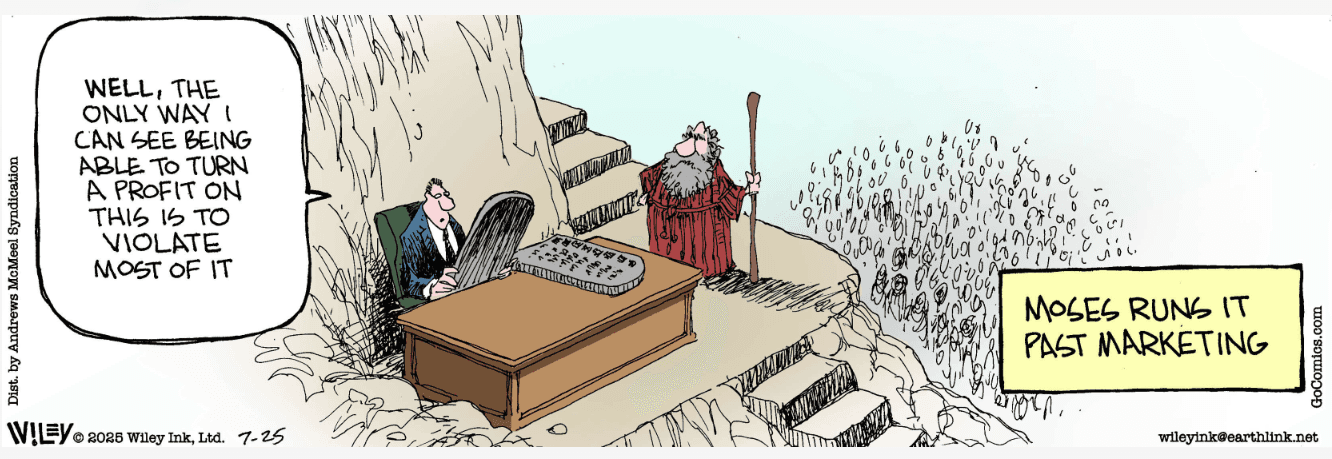BoSacks Speaks Out: When Marketing Stops Persuading and Starts Predating
By Bob Sacks
Thu, Nov 20, 2025

Gord Hotchkiss opens with a gut punch: “I hate marketing.”
That is not a clever hook. It is a verdict from someone who spent forty years inside the machine. This is not a barstool rant about annoying ads. It is a seasoned pro watching the craft slide from relationship building to behavior engineering, from “How can we help?” to “How much can we get away with?”
I believe him. I have seen the same corrosion from my own perch.
When Tools Become Traps
Gord’s airline story is a master class in how tools meant to empower consumers morph into weapons aimed at them.
Flight tracking apps were supposed to level the playing field. Set an alert, wait, get notified when fares drop. Simple. Transparent. Consumer in control.
Then the airlines figured out how to flip the script. They dangle an artificially low fare to trigger your alert. You click through and suddenly you are in a carnival of upsells, guilt prompts, and “limited time” panic buttons. Seat shaming? Check. Insurance fearmongering? Double check. “Do you really want to risk disaster for your loved ones?” Triple check.
What began as a service becomes an ambush. The app designed to protect you now funnels you into a gauntlet.
That is not smart marketing. That is trust betrayal wrapped in UX candy.
The Brief Golden Age of Search
Gord draws a line I agree with. For a while, search marketing felt almost ethical.
Why? Because it answered intent instead of manufacturing it.
If I type “running shoes size 11,” I am already in the market. The marketer helps me match need to offer. That is honest work. You can argue about clutter, but the relationship is sound.
That was a rare moment when marketing and user interests aligned. No tricks required. You raised your hand.
Of course, we could not leave it there. We never do.
Social Media: From Persuasion to Psychological Mining
Then social media arrived and torched the landscape.
These platforms are not bulletin boards. They are behavioral laboratories. They exploit cognitive biases, inflame emotions, and keep you scrolling for as long as possible. That is the business model: engagement at any cost.
Marketing plugged into this system and supercharged the addiction mechanics. We moved from category ads to micro-targeted experiments. Every click, pause, and hesitation feeds an endless A/B test that serves the platform first, the advertiser second, and you somewhere after the janitor.
Gord calls it a cesspool. That is polite. I call it industrial-scale emotional tampering.
The Integrity Vacuum in the Boardroom
The real problem is not the tech. Tools are neutral. The problem is the meeting.
None of this happens by accident. People sit in conference rooms, stare at dashboards, and calmly design ways to squeeze more dollars from every transaction. Those five upsell attempts during your flight booking? They are not random. They are the result of multiple teams, multiple sprints, and relentless optimization. Every color, every phrase, every prompt is tested to wear you down.
This is not service. It is attrition.
At that point, marketing as relationship building is dead. What remains looks like Gord’s metaphor: an emotionally abusive relationship. Keep the customer off balance, frighten them into add-ons, and call it “choice.”
Choice like a rigged carnival game is “chance.”
The Soul of Marketing: Sold for Short-Term Gain
Here is the truth most CMOs will not say aloud:
Much of modern marketing is ethically bankrupt.
Personalization, behavioral targeting, dynamic pricing, real-time bidding, these shiny tools were deployed first and hardest for extraction, not value creation. Instead of asking, “How do we make this product worth the money?” the question became, “How do we use data to make them pay more, click more, commit more, and cancel less?”
You see it in airline booking flows.
You see it in subscription traps that make canceling harder than signing up.
You see it in “free trials” that hide renewal terms like state secrets.
This does not build loyalty. It breeds resentment.
Where This Leaves Us
Marketing stands at a fork in the road.
One path is what we are on now: more data, more profiling, more tricks to keep people from noticing how much they pay and how little they get. Short-term gains, long-term rot.
The other path is harder. It asks marketers to become what they once pretended to be: a bridge between real human needs and products that honestly meet those needs. That is not romantic. It is sustainable. People return to brands that do not make them feel stupid or hustled.
Gord’s disgust after four decades is not a throwaway line. It is a flare. When lifers say, “I hate what this has become,” the profession is in late-stage crisis.
The question is simple: Do we want marketing to remain part of the civic fabric, or are we content to let it devolve into a con game with better analytics and prettier fonts?
BoSacks Final Thought:
Persuasion is not the problem. Predation is. If your marketing plan only works when people are confused, cornered, or worn down, you do not have a strategy. You have a mugging with a user interface.
